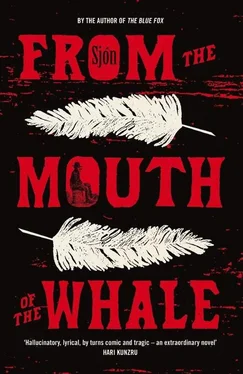Early next morning Jónas the Learned was summoned to Ole Worm’s study, where he discovered that it was not from benevolence alone that he had been spared a longer sojourn in the Blue Tower. He had no sooner taken a seat facing his benefactor than the latter began to grill him on the most unrelated of topics, though principally on runes and other heathen lore in the sagas of the ancient Icelanders: ‘Tell me about the mound dwellers’ script’, ‘Who was Bragi?’, ‘What does futhark mean?’ Jónas grew nervous and feigned ignorance, pretending not to understand the questions even when Worm spoke in Danish, or else answered at random ‘oh’ and ‘er’, and sometimes ‘well’. This shilly-shallying lasted until noon, when a man was sent out to fetch Reverend Pálmi Gudmundur, who explained to his father that Worm’s interest in the heathen past was purely scholarly and that nothing he spoke of within the university walls would be used against him. Jónas was not entirely convinced. But Reverend Pálmi Gudmundur had also brought along Jónas’s belongings: his paints, knives, books and papers — and the Great Auk that he had been feeding over the winter. The collector was delighted to receive a living specimen of this fabled avian oddity and embraced the giver, kissing him repeatedly. Worm apologised to Jónas for having overwhelmed him with questions for which he was unprepared, but he had been so excited to meet the learned Icelander in the flesh that he could not contain himself. He showed Jónas the replies he had received to the numerous letters he had written to his countrymen enquiring after him, and Reverend Pálmi Gudmundur translated them from Latin for the benefit of their subject. Magnús of Laufás, for instance, had written: ‘From what I have heard, you will shortly receive a visit from the man who is the finest runic scholar among us despite the heavy sentence he has been given for sorcery — he will be travelling on Commissioner Rosenkrantz’s ship, I gather. With him at your side you will have verbal answers to the points that seem unclear in the interpretation and if you wish you can with his help “seek gold from the dung-heap of Ennius”. His name is Jónas Pálmason, called “the Learned”, and from what I have been told he is knowledgeable on many subjects.’ Jónas was standing on tiptoe by the end of the reading. The upshot was that he agreed to remain in lodging with Dr Worm, while Reverend Pálmi Gudmundur returned to prepare his defence for the imminent hearing of his own appeal.
The days now passed in discourse of runes and old Icelandic poetry. Ole Worm placed many riddles before Jónas on the Eddic and Skaldic compilations of Snorri Sturluson, which he was able to answer straight off. The previous year Worm had published a history of the runic art entitled Danica literatura antiquissima, vulgo Gothica dicta , and he now received confirmation of his suspicions that it contained much that was mistaken or obscure. But the university rector had other duties to attend to besides tapping Jónas’s wisdom, and this gave the latter the chance to observe the work in Worm’s collection of natural history and curiosities, known as the Museum Wormianum. Here the collector had assembled a vast array of organic specimens and objects related to his many fields of study: medicine, antiquarianism, philosophy, the natural history of animals, minerals and plants, and also works of art and antiquities. An elite team of the rector’s favourite students was busy cataloguing the collection, arranging the objects on shelves and in drawers, hanging them on walls or from ceiling beams, or displaying them on specially built plinths. Here Jónas set eyes for the first time on many marvels that he had hitherto only read about in books: there were large pieces of coral, ostrich eggs, lemming skins and petrified dragons’ teeth — for the collection was not only the largest of its kind in the world but unusual for being founded on the strictest scientific principles rather than the magpie fascination for glittering objects and childish glee in hoarding that tended to characterise the collections of electors and queens. Ole Worm was preparing to publish a catalogue of the museum’s curiosities, and the students were engaged in recording the names and provenance of the objects according to the curator’s careful system, as well as finding engravings of them in older scientific writings or else sketching pictures of those that had never before appeared in print. Not all the young men were equally skilled draughtsmen and as a result the illustration of the work was progressing more slowly than it should, until one of the students came upon Jónas the Learned sitting alone in the library with his paints, beguiling the time by copying the illustration of the bearded lady in a dress from Aldrovandi’s Monstrorum historia , which he naturally executed with consummate skill. He was enlisted forthwith to sketch the objects in pencil for others to finish in ink. Worm praised his museum team for their increased productivity and the quality of the drawings, and Jónas got to indulge in his favourite pastime while at the same time examining Worm’s objects and books. And so things continued until the time came to catalogue an object that was kept in a locked cabinet in the natural philosopher’s study. This precious item was borne into the museum with great ceremony, and two lancers from the royal bodyguard no less were set to guard the door. The object was about five ells long, wrapped in a cloth of scarlet velvet with the insignia of Christian IV embroidered on it in gold, and naturally the learned doctor saw personally to its handling and cataloguing, for he had been graciously permitted to borrow it for purposes of research from the king’s private collection. The students crowded around the long examination table to watch as Worm ran his gloved hands over the cloth, deftly drawing it back to reveal a magnificent unicorn’s horn. But this was no ordinary specimen of the shy beast’s cranial ornament, for the horn was fixed in a fragment of skull-bone. The spectators gasped: it was most unusual for any remains to be found of a unicorn besides the splendid twisted horn; other bones were extremely rare and scholars were more or less agreed that those found in museums were fake. But here was part of the forehead and crown of the beast, which could therefore be compared to the head of other cloven-hoofed creatures, for the unicorn was generally regarded as being most closely related to the ibex.
Jónas Pálmason the Learned began to laugh and could not stop. His short legs buckled under his quaking body and he dropped to the floor, where he lay hooting as if he were in tears. The students exchanged glances; they were ready for anything with Jónas, who was always mumbling to himself and blurting out non sequiturs, but this wild behaviour was both sinister and inappropriate in the presence of the rector and the royal treasure. The lifeguards, who had not encountered Jónas before but considered themselves as adept as university men at identifying lunatics, grew uneasy and tightened their grip on their lances. Everyone waited in suspense for the reaction of the learned and courteous yet severe Preceptor Worm. Leaving the table, he took up position beside the laughing man, inclined his head and frowned, holding his beard and stroking it down over his chest, as if confronted with an unusual form of malady.
After long reflection, the learned doctor straightened up and exclaimed:
‘Well, I might have known it …’
And he too was seized with uncontrollable laughter. Bending down, he extended a hand and helped Jónas to his feet, declaring between fits of mirth:
‘Of course, of course!’
Still chuckling, he ordered his assistants to wrap up the unicorn’s horn and return it to his study. When this had been done, Worm and Jónas retired there themselves, laughing together. The students mimicked their master: ‘Of course, of course!’, though ignorant, naturally, of what had prompted his exclamation. Of one thing they could be sure: their master’s roars of laughter were a sign that he had made a remarkable discovery. Worm was such an inveterate scholar that he was never more amused than when he discovered that he had been wrong.
Читать дальше












